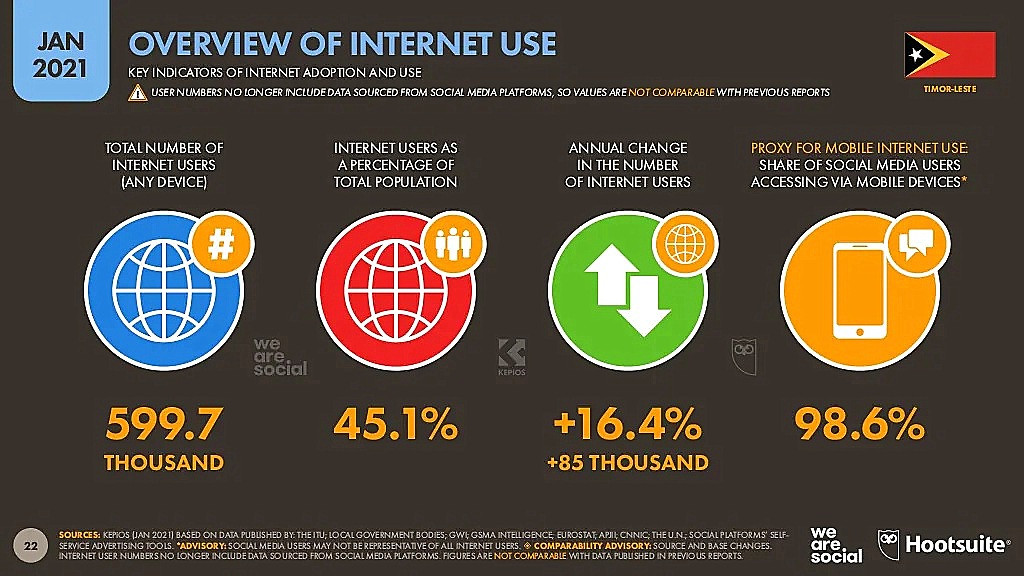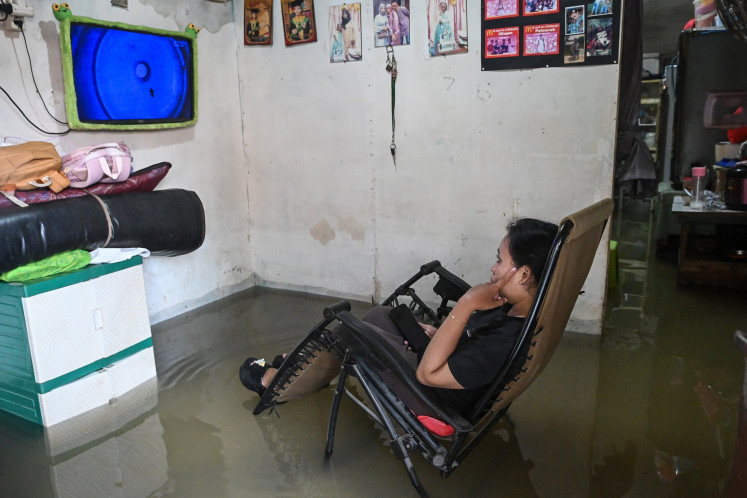Popular Reads
Top Results
Can't find what you're looking for?
View all search resultsPopular Reads
Top Results
Can't find what you're looking for?
View all search resultsTimor-Leste’s internet freedoms at risk
Without pushback from civil society, and if oversight mechanisms for these laws are not appropriately implemented, the small nation stands to dilute its hard-won freedoms.
Change text size
Gift Premium Articles
to Anyone
F
reedoms in Timor-Leste are under threat from a series of draft legislation that stands to criminalize critical content, increase surveillance online and expose citizens’ personal data to possible privacy breaches. Without pushback from civil society, and if oversight mechanisms for these laws are not appropriately implemented, the small nation stands to dilute its hard-won freedoms.
Deteriorating freedoms in Timor are of a particular concern as the country pursues accession to ASEAN, an authoritarian-heavy group whose freedom rankings in the last decade have been on the decline and point to a regression in regional democracies.
This risk would be further exacerbated by Timor-Leste’s choice investment partner for the development of its internet infrastructure. Australia, China, Indonesia, the United States and Vietnam are competing to invest in Timor’s critical infrastructure. The choice and values of Timor’s partners for infrastructure and telecommunication service providers, will have a knock-on effect on censorship and internet surveillance.
Presently, Timor-Leste ranks high on freedom indices across academic, internet and press thresholds, according to the Global Public Policy Institute, Reporters Without Borders and Freedom House.
In spite of high costs and poor access, internet accessibility has increased year on year, expanding coverage and consequently, social media use. The online sphere is increasingly being used to express critical opinion, scrutinize political incumbents and progress democratic ideals.
Resultantly, political leaders and government officials who feel offended by poignant criticisms have made use of current legislation, pushed for amendments to existing laws and drafted new laws to curtail online criticisms.
In the past decade, the Timorese government has misused articles in the Penal Code to attempt to prosecute critical journalists. For example, in November 2016, a slanderous denunciation charge was filed against Raimundos Oki and Lourenço Vicente Martins, journalists of the Timor Post, under Section 285 of Penal Code. Although the charges were dropped in 2017, the misuse of current legislation provides an indication of what may occur should the proposed Criminal Defamation Law, under the Penal Code, be introduced.
The proposed Criminal Defamation Law would provide a clear pathway to stifle online criticism in Timor-Leste, especially those directed towards public officials. The implementation of the Criminal Defamation Law would only serve to promote an environment of fear and self-censorship among journalists, social media bloggers, civil society activists and ordinary citizens, as they could face harsh penalties for sharing sound critical dissent.
Another proposed draft law is the Cybercrime Bill, aimed at tackling crimes that have arisen from increased internet penetration. It has numerous vaguely-worded provisions focusing on cybercrimes and the collection of evidence pertaining to such crimes. One such example, among others, would be the vague provisions on the type of data collected, the level of severity of a crime to be investigated, and the destruction of data after investigations, in Articles 15 to 21.
The ambiguous provisions have the potential to be misused in order to investigate any critical debate aimed at the government. The lack of information on the destruction of data after investigations could result in the misuse of such data by the government to continue surveilling citizens, threatening their privacy. Additionally, the draft law does not stipulate the need for ‘intention’ in criminalizing these acts, which would criminalize access to data even to expose human rights violations.
The introduction of these laws in their current form would severely regress Timor’s digital freedom rankings, while inevitably effectuating backslides in other related facets of freedom of expression, such as press and academic freedoms.
On the cards is a new draft law on Data Privacy and Protection which was announced by the Timorese government in early 2021. This is in tandem with the implementation of a unique ID system, aimed at facilitating citizens’ access to a wide array of public and private sector services. The proposed online ID system would obtain citizens’ personal and biographical information in order to authenticate their identity.
Whether the law’s oversight and enforcement mechanisms will indeed ensure the protection of personal data, or rather enable its abuse, is still to be seen, as its specific provisions have yet to be published. There are worries concerning this proposal with respect to the rights to consent of personal information, particularly with the naivety surrounding digital literacy in the nation.
A key challenge to realizing internet freedoms in Timor-Leste has been its telecommunication infrastructure. Cable connections are limited, signals are unstable and access is expensive, ultimately disrupting access to information. Without stable, affordable internet access, the Timorese population, especially the youth — the most politically engaged and frequent users of the internet — cannot fully express themselves and articulate their concerns to policymakers and elected officials.
Current expansion and efficiency in infrastructure, however, is set to be significantly increased. A submarine internet cable connecting Timor to Australia’s network was approved in 2020, after a similar project with Indonesia fell through in 2018 due to opposition resistance. This would reduce Timor’s dependence on satellites and provide a reliable connection at a cheaper cost.
As the project with Australia is yet to be implemented, it remains to be seen whether there will be any shift toward another partner if government coalitions change, or the state sees a new government of the day. Any shift in infrastructure or telecommunication partners would test Timor’s internet freedoms as the values of the investor will shape surveillance protocols and impact censorship.
Timor-Leste’s efforts to improve connectivity and introduce new legislation that may risk internet freedoms is a struggle over its own values that led to its independence. Yet, in pursuing accession to ASEAN, the emergence of these proposed draft laws are a concerning hint at Timor-Leste’s new conflict with its own democratic identity.
***
The writer is regional director of the Asia Centre. This article is based on the Centre’s baseline study “Timor-Leste: Internet Freedoms Under Threat” published on July 14, 2021.










